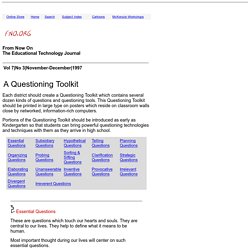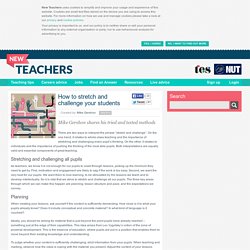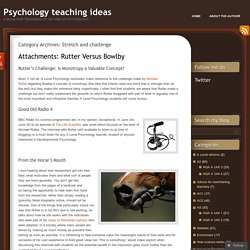

Questioning Toolkit. Essential Questions These are questions which touch our hearts and souls.

They are central to our lives. They help to define what it means to be human. Most important thought during our lives will center on such essential questions. What does it mean to be a good friend? If we were to draw a cluster diagram of the Questioning Toolkit, Essential Questions would be at the center of all the other types of questions. All the other questions and questioning skills serve the purpose of "casting light upon" or illuminating Essential Questions. Most Essential Questions are interdisciplinary in nature. Essential Questions probe the deepest issues confronting us . . . complex and baffling matters which elude simple answers: Life - Death - Marriage - Identity - Purpose - Betrayal - Honor - Integrity - Courage - Temptation - Faith - Leadership - Addiction - Invention - Inspiration.
Essential Questions are at the heart of the search for Truth. Essential Questions offer the organizing focus for a unit. How to stretch and challenge your students. There are two ways to interpret the phrase “stretch and challenge”.

On the one hand, it relates to whole-class teaching and the importance of stretching and challenging every pupil’s thinking. On the other, it relates to individuals and the importance of pushing the thinking of the most able pupils. Both interpretations are equally valid and essential components of great teaching. Stretching and challenging all pupils As teachers, we know it is not enough for our pupils to coast through lessons, picking up the minimum they need to get by. Planning When creating your lessons, ask yourself if the content is sufficiently demanding.
Ideally, you should be aiming for material that is just beyond the point pupils have already reached – something just at the edge of their capabilities. To judge whether your content is sufficiently challenging, elicit information from your pupils. Do not be averse to plunging your pupils into the realms of uncertainty from time to time. 1. 2. 3. Evaluation. Assessment for Learning stretch and challenge. Joannemilesconsulting.
Psychology teaching ideas. Rutter’s Challenge: Is Monotropy a Valuable Concept?

Most, if not all, A Level Psychology textbooks make reference to the challenge made by Michael Rutter regarding Bowlby’s concept of monotropy (the idea that infants need one bond that is stronger than all the rest) but they make this reference fairly superficially. I often find that students are aware that Rutter made a challenge but don’t really understand the grounds on which Rutter disagreed with part of what is arguably one of the most important and influential theories A Level Psychology students will come across. Good Old Radio 4 BBC Radio 4’s science programmes are, in my opinion, exceptional. In June (3rd June 2014) an episode of The Life Scientific was aired which focused on the work of Michael Rutter. From the Horse’s Mouth I love hearing about how researchers got into their field, what motivates them and what sort of people they are more generally.
In the Classroom Other scientific lives. Teachit English Stretch. A2 Chemistry Stretch and Challenge pack - Resources - TES. A2 Biology Stretch and Challenge pack - Resources - TES. A2 Physics Stretch and Challenge pack - Resources - TES. Playing Cards. The Bloom Buster. Challenge Toolkit. Joseph Rowntree School. TED.